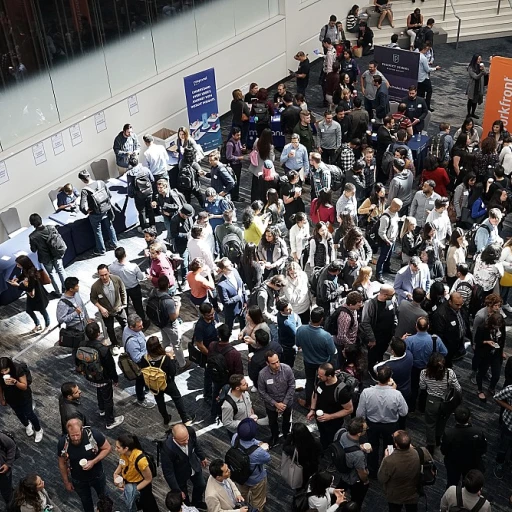
Understanding the Vision and Strategy
Defining the Tech Aspirations and Goals
When engaging in discussions with senior leaders about tech hiring, a crucial point is to understand the organization's vision and strategy. Knowing the direction of the company not only helps you align recruitment strategies but also ensures that you're attracting candidates who resonate with these goals. When you sit down with senior leaders, it's essential to pose specific questions that dig deep into their long-term aspirations. Consider these points for a fruitful conversation:- Alignment with Business Goals: Ask leaders about how technology will support the overarching business objectives. Is there a particular digital transformation the company is pursuing?
- Strategic Questions about Growth: How does the tech strategy align with the company culture and future career growth opportunities for team members?
- Time and Resources Allocation: Understand the timeline and resources allocated to achieving these tech-driven goals. Will there be support for work-life balance amidst these projects?
Evaluating Leadership Style and Culture Fit
Exploring Leadership Dynamics and Cultural Alignment
When engaging with senior leaders in tech hiring, it's crucial to delve into their leadership style and how it aligns with the company's culture. Understanding this dynamic can significantly impact the long-term success of both the organization and its employees. Here are some strategic questions to consider:
- What is your approach to leadership development? This question helps gauge how senior leaders prioritize professional development and career growth for their team members. It also sheds light on the organization's commitment to nurturing talent.
- How do you foster employee engagement and ensure a positive company culture? Inquiring about employee engagement strategies can reveal how leaders maintain a productive and supportive work environment, which is essential for retaining top talent.
- Can you describe a time when your leadership style had to adapt to a significant business challenge? This question provides insight into the leader's flexibility and decision-making skills during periods of change, which is particularly relevant in the fast-paced tech industry.
- How do you balance work life and privacy policy considerations in your leadership approach? Understanding how leaders manage work-life balance and privacy concerns can help assess their ability to create a sustainable and respectful workplace.
Asking these questions will help you evaluate whether a senior leader's style and the organization's culture are a good fit for your career aspirations. For more insights on navigating temporary job shifts in the recruitment sector, consider exploring this resource.
Assessing Technological Expertise and Innovation
Technology Leadership and Innovation: Key Considerations
In today's competitive business landscape, a senior leader's expertise and capacity for innovation can play a significant role in driving an organization's success. As technology rapidly evolves, ensuring that the leadership team can adeptly navigate this change is essential. To gauge technological prowess and innovative capacity, here are some questions that you can pose to senior leaders during the hiring process:- How does the senior leader keep up with emerging trends and innovations in technology? This question can provide insights into their capacity for ongoing professional development and their ability to contribute to digital transformation.
- Can you discuss a time when you implemented a technological innovation that significantly improved the company's workflow or product offering? Understanding the tangible impact of their leadership style in past experiences helps to forecast potential success in your business setting.
- Which strategies do you use to foster a culture of innovation within your team members? Insights here reveal their approach to leadership development and employee engagement, elements crucial for sustaining long-term company growth.
Prioritizing Diversity and Inclusion
Fostering an Inclusive and Diverse Workplace
One crucial aspect that senior leaders in tech hiring need to address is the promotion of diversity and inclusion within their organizations. This is not just about filling quotas or ticking boxes; it's about cultivating a company culture that recognizes and values the unique contributions of all employees. When asking questions during interviews, it's essential to gauge how committed leaders are to building a diverse team and how they envision fostering an inclusive environment.- Ask strategic questions about the organization's current diversity initiatives and how senior leaders plan to integrate these into the company's long-term strategy.
- Inquire about specific steps being taken to ensure all voices are heard, especially in decision making processes. This reveals how much weight is given to diverse perspectives in shaping the business direction.
- Find out how leaders address diversity and inclusion at various levels of leadership and how they plan to track the progress.
Measuring Success and Performance
Defining Metrics and Standards
In any organization, understanding the metrics and standards used to gauge success is crucial. Senior leaders should be clear about how they assess performance and what key performance indicators (KPIs) are prioritized. This clarity will help team members align their work with the company's objectives, fostering a strong company culture. As a tech hiring team member, you'll want to ask questions about the metrics used by senior leaders to measure the effectiveness of digital transformation initiatives, employee engagement, and overall business growth. Strategic questions about how they define success at both the team and organization levels are critical.Tracking Progress Over Time
Success is not just about reaching certain goals—it's also about tracking progress and adapting to changes. Senior leaders need to be agile in decision-making and responsive to challenges that arise over time. By continually evaluating the strategies in place, they can ensure long-term success for the organization. Posing interview questions that revolve around long-term tracking mechanisms can provide insights. For example, how do they ensure professional development and career growth for employees while maintaining accountability and performance standards?Linking Performance to Professional Development
Another important aspect of measuring success is how it ties into leadership development and career advancement opportunities. For employees, understanding how their performance will impact their career growth within the company is essential. Senior leaders should articulate clear connections between an employee's performance metrics and their potential for advancement. Questions rooted in career development will shed light on whether the organization values its employees’ growth as part of its success metrics.Navigating Challenges and Change
Efficiently Overcoming Obstacles in Tech Hiring
In the rapidly evolving landscape of technology, companies must prepare themselves to tackle unforeseen challenges that arise within the hiring process. Fostering a resilient team that can adeptly handle these issues is a crucial element in any organization's quest for maintaining a competitive edge. Engaging senior leaders in thoughtful discussions can provide invaluable insights for navigating complexities associated with tech recruitment. To begin with, consider asking senior executives about the major challenges they have faced in tech hiring. This allows you to gauge their problem-solving capabilities and understand their decision-making process. Leaders who have successfully overcome such obstacles generally possess a profound understanding of how these challenges might impact long-term success.- Understanding the Risks and Mitigations: When querying about challenges, it's important to also explore risk assessment strategies. A senior leader's ability to identify potential problems before they arise is key. What are their strategies for mitigating risks in tech hiring?
- Adaptability to Change: Digital transformation is unavoidable, and tech hiring is no exception. Discuss how senior leaders adapt to constant technological change while ensuring the company's privacy policy and work-life balance protocols are preserved.
- Employee Engagement During Challenges: Sustaining employee engagement can be difficult during challenging periods. Inquire about techniques they've employed to keep team members motivated and aligned with organizational goals.












